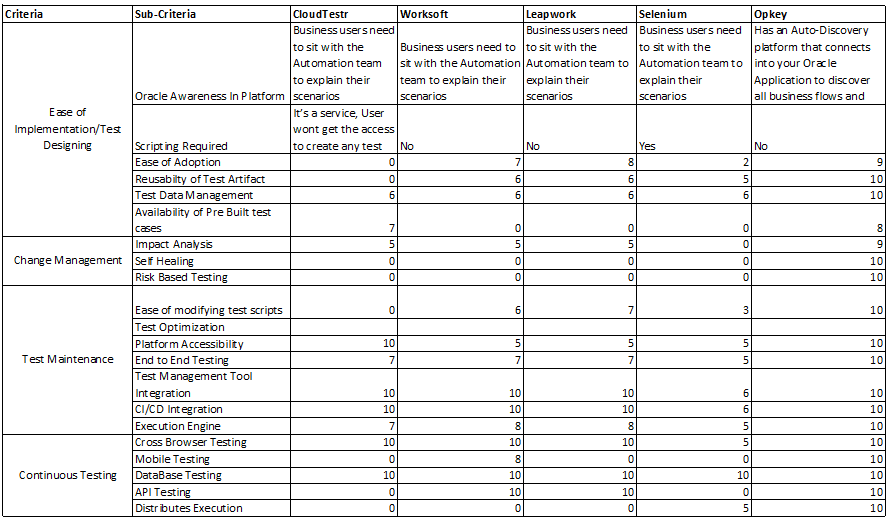Oracle has become much more than an ERP system. Oracle’s digital core is the central nervous system for enterprises providing ERP solutions with hundreds of cross-industry capabilities. An Oracle environment is a vast ecosystem consisting of multiple integrations, processes, patches, and new releases.
Assuring the quality of such a vast system without an Oracle test automation tool will be difficult. That is why it’s critical to navigate and understand the large pool of tools that exist today, to understand which tool will be the right fit for your exact Oracle environment, which is no easy task. An ideal Oracle test automation tool should be able to accelerate the delivery speed, minimize business risks, and lower testing costs for an enterprise.
- The tool you select should be Oracle-aware and understand how Oracle elements are different from normal web applications. It should have features like an Oracle specific record/playback engine where scripts can be created & resused easily without performing manual actions.
- The Oracle automation tool should have an intuitive user interface that allows business users to create and maintain tests without the need for skilled resources for coding. It should require no coding skills.
- The tool should contain pre-built test-script libraries for Oracle Cloud applications that can help accelerate the automation set up.
- The tool should allow you to easily reuse tests so you can save time and money on your test maintenance..
- The tool should specialize in Oracle automation and should include Impact Analysis Technology, which allows users to easily determine which test cases are impacted during certain updates and releases.
- The tool should support multiple channels of accessing your Oracle Cloud, meaning it works across l web, mobile, desktop, and other emerging technologies.
- It should have a user-friendly UI where any business user or tester can track where test cases failed.
- The tool should support integrations with other test management and CI tools without additional coding skills.
- The tool should support End-to-End testing, meaning that all applications and technologies that integrate with your Oracle environment are adequately tested.
- The tool should provide additional Oracle Cloud testing related features like different module reports, security validation, and Payroll Data Validation.
Let’s take a closer look at each of these features and explain why they are important for your future Oracle test automation platform.
Breadth of Technology Support
Oracle applications are distributed and interconnected with multiple business processes, like APIs, web UIs, mobile and web services, ESBs, mainframes, and other ERPs. Most enterprises have test cases that span across multiple applications from different vendors. For example, it’s common to integrate Oracle Cloud with Salesforce for an End-to-End CPQ process, or integrate Oracle Cloud with Oracle EBS for HCM use cases. If your automation testing tool doesn’t support testing across technologies, you are forced to use several automation solutions under one roof which will make test maintenance incredibly resource-intensive and almost impossible to scale.
As an example, Selenium doesn’t work well with Oracle EBS, which is a Desktop-based Java application. This makes end-to-end test automation nearly impossible for enterprises using Selenium or other open-source web automation tools.
Ease of Test Maintenance
Oracle applications are distributed and interconnected with multiple business processes, like APIs, web UIs, mobile and web services, ESBs, mainframes, and other ERPs. Most enterprises have test cases that span across multiple applications from different vendors. For example, it’s common to integrate Oracle Cloud with Salesforce for an End-to-End CPQ process, or integrate Oracle Cloud with Oracle EBS for HCM use cases. If your automation testing tool doesn’t support testing across technologies, you are forced to use several automation solutions under one roof which will make test maintenance incredibly resource-intensive and almost impossible to scale.
As an example, Selenium doesn’t work well with Oracle EBS, which is a Desktop-based Java application. This makes end-to-end test automation nearly impossible for enterprises using Selenium or other open-source web automation tools.
No-Code Interface
In the highly versatile Oracle environment, tools that take advantage of AI, advanced analytics, machine learning, and process discovery are highly recommended. These features enable organizations to quickly create, and later maintain, tests.
Codeless testing tools help business users quickly create and maintain modular tests without the need for any coding knowledge.
A codeless interface also allows pre-built test components to be easily reused in different types of tests. As application requirements change, the test suite can be updated automatically, allowing organizations to mitigate risks by instantly identifying the impacted tests from each Oracle Cloud update.
Automating with Selenium requires a decent level of coding skills. Since it’s quite difficult to find people with an expertise in both systems, Selenium and Oracle, organizations often end needing a joint team of coding experts and Oracle Functional Experts to test with Selenium. This, of course, is quite expensive.
Given everything you now know, the below is the comparison of available Oracle test automation tools:

And for more information on how Opkey compares to Selenium and Oracle’s own test automation solution, OATS, check out this blog post.
How can Opkey Help?
Opkey is the industry’s leading codeless test automation tool with a sophisticated understanding of the Oracle technology stack. With Opkey’s pre-built test accelerator, you can reuse assets you’ve already built with no additional work. You can model your business processes once and then reuse them endlessly, which greatly speeds up your automation flows and helps you reduce your maintenance burdens – a major time-saver and cost-saver in the long run. Let’s explore what more Opkey offers.
1. Reduced Risks – through our pre-built library of thousands of Oracle test scripts, we can help you achieve 100% test coverage instantly. This ensures that defect leakage is zero, and business continuity can be guaranteed.
2. Fast set up –
- Opkey’s system can get up and running in just two days
- Very low involvement from business teams are needed during set up – three sessions that are two hours each
- Patch/Update Certification in three days flat – Saving 60 days of effort per employee per cycle at the minimum
- Opkey’s system can get up and running in just two days
- Very low involvement from business teams are needed during set up – three sessions that are two hours each
- Patch/Update Certification in three days flat – Saving 60 days of effort per employee per cycle at the minimum
If your current solution is not testing all possible scenarios for your quarterly Oracle Cloud update, you are exposing your business to critical risk, let us help!







